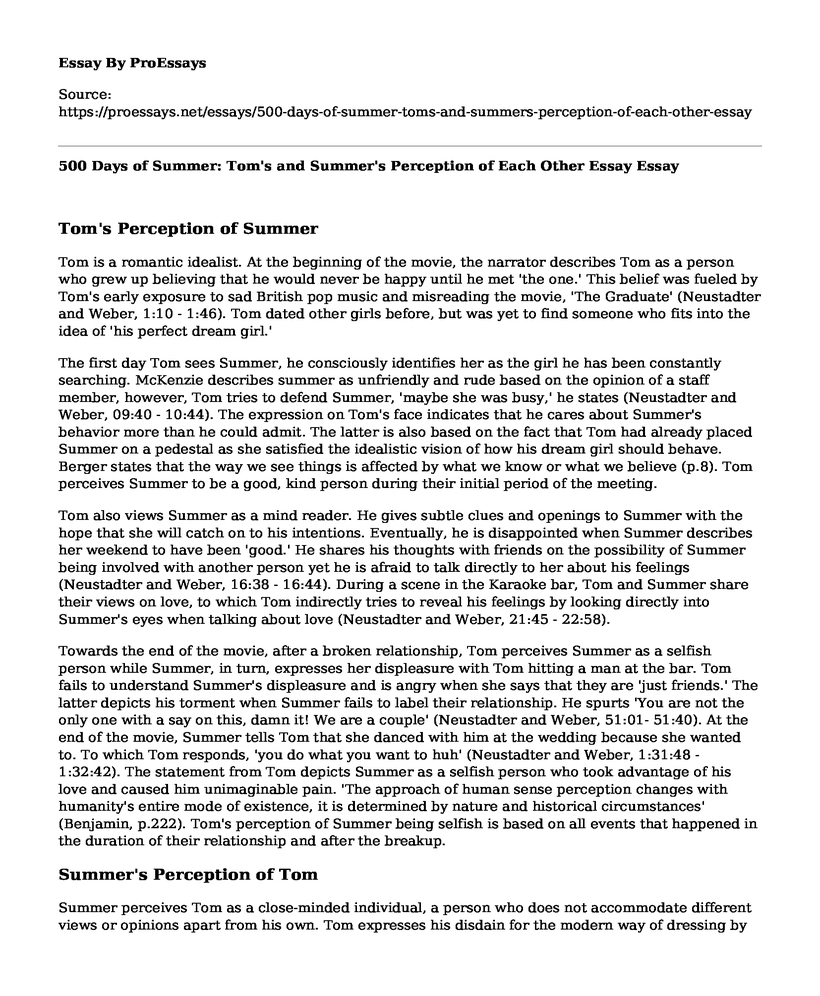Tom's Perception of Summer
Tom is a romantic idealist. At the beginning of the movie, the narrator describes Tom as a person who grew up believing that he would never be happy until he met 'the one.' This belief was fueled by Tom's early exposure to sad British pop music and misreading the movie, 'The Graduate' (Neustadter and Weber, 1:10 - 1:46). Tom dated other girls before, but was yet to find someone who fits into the idea of 'his perfect dream girl.'
The first day Tom sees Summer, he consciously identifies her as the girl he has been constantly searching. McKenzie describes summer as unfriendly and rude based on the opinion of a staff member, however, Tom tries to defend Summer, 'maybe she was busy,' he states (Neustadter and Weber, 09:40 - 10:44). The expression on Tom's face indicates that he cares about Summer's behavior more than he could admit. The latter is also based on the fact that Tom had already placed Summer on a pedestal as she satisfied the idealistic vision of how his dream girl should behave. Berger states that the way we see things is affected by what we know or what we believe (p.8). Tom perceives Summer to be a good, kind person during their initial period of the meeting.
Tom also views Summer as a mind reader. He gives subtle clues and openings to Summer with the hope that she will catch on to his intentions. Eventually, he is disappointed when Summer describes her weekend to have been 'good.' He shares his thoughts with friends on the possibility of Summer being involved with another person yet he is afraid to talk directly to her about his feelings (Neustadter and Weber, 16:38 - 16:44). During a scene in the Karaoke bar, Tom and Summer share their views on love, to which Tom indirectly tries to reveal his feelings by looking directly into Summer's eyes when talking about love (Neustadter and Weber, 21:45 - 22:58).
Towards the end of the movie, after a broken relationship, Tom perceives Summer as a selfish person while Summer, in turn, expresses her displeasure with Tom hitting a man at the bar. Tom fails to understand Summer's displeasure and is angry when she says that they are 'just friends.' The latter depicts his torment when Summer fails to label their relationship. He spurts 'You are not the only one with a say on this, damn it! We are a couple' (Neustadter and Weber, 51:01- 51:40). At the end of the movie, Summer tells Tom that she danced with him at the wedding because she wanted to. To which Tom responds, 'you do what you want to huh' (Neustadter and Weber, 1:31:48 - 1:32:42). The statement from Tom depicts Summer as a selfish person who took advantage of his love and caused him unimaginable pain. 'The approach of human sense perception changes with humanity's entire mode of existence, it is determined by nature and historical circumstances' (Benjamin, p.222). Tom's perception of Summer being selfish is based on all events that happened in the duration of their relationship and after the breakup.
Summer's Perception of Tom
Summer perceives Tom as a close-minded individual, a person who does not accommodate different views or opinions apart from his own. Tom expresses his disdain for the modern way of dressing by women and the drawing of tattoos. Summer is against such reasoning as she believes people dress and conduct themselves according to their wishes. She bluntly suggests getting a 'butterfly tattoo' on her elbow, to which Tom immediately replies on the negative (Neustadter and Weber, 48:12 - 48:41).
Summer also perceives Tom as a coward. Tom works at a company dealing with writing cards whereas his passion is in architecture. At Summer's party, she says, 'he would have been an architect if he wanted' (Neustadter and Weber, 1:15:46 - 1:16:30). Settling for card writing company paints tom as an individual who lacks the independence to do what they love, is not free-spirited or courageous. The film politicizes at by using Summer who tries to change the Tom who is a representation of individuals in the society accommodating fascism because they are not willing to fight and go for what they want (p.242).
According to Berger, (p.7), 'the relation between what we see and what we know is never settled.' At the earlier stages of the movie, the images try to convince the audience of the possibility that Summer could fully reciprocate Tom's love but prior information from the narrator damages this conviction.
Works Cited
Benjamin, Walter. Illuminations: Essays and Reflections. Ed. Hannah Arendt. Trans. Harry Zohn. New York: Schocken Books, 1968.
Berger, John. Ways of seeing. Vol. 1. Penguin UK, 2008.
Neustadter, Scott & Weber, Michael. "(500) Days of Summer." Youtube, 27 October 2017, https://www.youtube.com/watch?v=xe9zncib-AE. Accessed 4 October 2018.
Cite this page
500 Days of Summer: Tom's and Summer's Perception of Each Other Essay. (2022, Aug 15). Retrieved from https://proessays.net/essays/500-days-of-summer-toms-and-summers-perception-of-each-other-essay
If you are the original author of this essay and no longer wish to have it published on the ProEssays website, please click below to request its removal:
- Music Engineering Section Essay
- Definition of Meaningfulness, Happiness, and Morality Using Todd May Ideas
- Summary and Response on Emmett Till's Casket Painting Paper Example
- Film Analysis Essay on Fiddler on the Roof
- Facebook: A Tech Giant's Ambitions and Competition - Essay Sample
- Essay Example on Grow Self-Awareness: Exploring the Power of Self-Concept
- Free Essay Sample on Enlightenment: Man's Emergence From Self-Imposed Nonage







